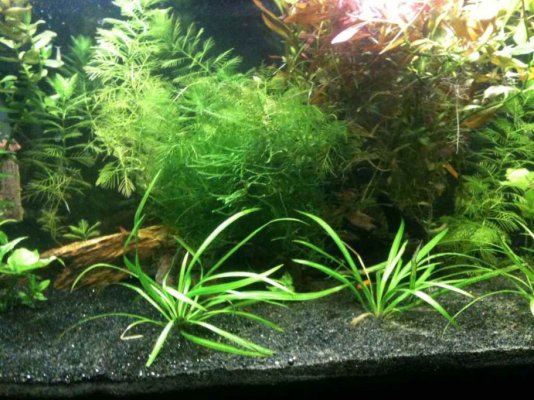Brookster123
Aquarium Advice Addict
Myth busters!!! I'm emailing them tonight!
Sent from my SAMSUNG-SM-G900A using Aquarium Advice mobile app
Sent from my SAMSUNG-SM-G900A using Aquarium Advice mobile app
may I ask, was this a camping accident? only reason I ask is because people get rocks from the river and put them around the fire, these rocks become "super heated" much hotter than what can be achieved on your stove. Most of the time a rock will just crack not explode unless air pockets are in the rock and they are super heated.
Good call on the api products, I also use them for my planted tank. Don't really need an expensive co2 system if what you are doing works just fine. I noticed significant growth with my amazon swords from just root tabs. The fish provide enough c02 for the plants
Lin.. while I'm sure you're correct, seems you're pretty freakin smahtsome rocks contain gas pockets or voids.. even at low temps (-125°), surely said pocket could expand resulting in an explosion of sorts.. it's just one of those things.. better safe than sorry..
What about the underground filters? Or canister filters? Is there such thing as a water cycler? Someone at work was telling me I would need one.. I've had your "basic" aquarium set ups before, but I want to do a better one this time around.
Sent from my iPad using Tapatalk
All the same really. A canister will generally be larger than a HOB but they all do the same thing mainly.
Best filtration you can do is weekly water changes imo.
Water changes will become part of your life, so do consider how to make them bearable, as if you avoid them when needed things go downhill very fast.
Canisters can be hidden underneath (if you have an underneath), HOB will always be visible. Canisters are generally more quiet than HOB, at least any of each I've seen, there may be exceptions.
Canisters do not need to be cleaned as often (much larger inside); HOB's are easier for most people to clean (I actually prefer cleaning a canister but lots of people find them awkward and heavy filled with water; I find it less messy as I can relocate the entire thing to a big sink).
Under-sand filters were more popular years ago, I had one, apparently they are no longer mainstream, but I cannot tell you why.
A "Water recycler" might have meant "filter" as in to prepare tap water for use? Usually an RO or RODI system (reverse osmosis deionization). For salt water generally considered a necessity, for fresh water not generally needed though many people with bad tap water will use them (or tap water way different from what the target fish like -- but aquarium fish are pretty adaptable).
That brings up water chemistry. Ignoring RODI water for a moment, you are best adapting to the PH and other attributes of your tap water, and NOT trying to alter it. There are exceptions -- if you had very acidic tap water you can make it a higher PH, but most people find tap water high (or too high) in PH and it is very difficult to lower it. But manufacturers will sell you lots of chemicals which claim to do that. And they do - usually temporarily or poorly. Get fish who can live in your tap water's chemistry (of course remove chlorine), as opposed to trying to "fix" it with chemicals.
The exception is that RODI water does fix anything -- but it comes at a price of hardware and then you have to add chemistry back in (it is effectively distilled water).
But as to a "recycler" I have no idea what that is, unless they just mean the HOB/Canister filters.
I really don't understand the aversion to bleach. I certainly wouldn't waste my time boiling rocks, when a simple bleach and water bath will accomplish the same if not more. As an oxidizer, bleach will soften or remove organic residues from rocks or any other hard substance that may go into the tank. I bleach everything; the tank, the substrate and decor, any hard filter parts, and sometimes even the plants.
I really don't understand the aversion to bleach. I certainly wouldn't waste my time boiling rocks, when a simple bleach and water bath will accomplish the same if not more. As an oxidizer, bleach will soften or remove organic residues from rocks or any other hard substance that may go into the tank. I bleach everything; the tank, the substrate and decor, any hard filter parts, and sometimes even the plants.
boiling or hot water would be more attravtive in that If bleach is not properly countered or neutralized it can destroy your tank.. ask any one who botched a purigen regen.. ask any reefer who got so fed up with their tankpbitawa.... it may break down to whatever but it is serious business when it's in its active state or whatever scientific term you see fit..
Sent from my SAMSUNG-SM-G900A using Aquarium Advice mobile app
I see what your saying brook, but bleach really only needs to be rinsed really well under tap water and then left out in the sun to air dry. You only use a 1 part bleach to 9 parts water solution.
When diluted with water it actually breaks down relatively quickly. I do take the extra step and let whatever i'm cleaning sit in a bucket of water and prime but that's just for safe measure. We all have the prime on hand anyway

To the OP:
Don't forget a power strip.
Heater + filter + light = 3 plug spaces. More if you run an air pump. I have stupidly forgotten this whilst setting up tanks thrice.
